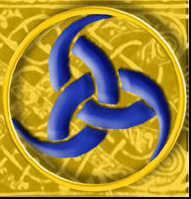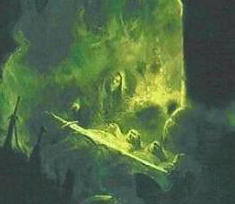
Terms of
Use
Submissions
~ Historical & Classical Poetry ~

Angantyr's only child was a daughter named Hervor, who dressed herself in mens clothing and joined a company of Vikings. Their ship happened to land at Samsey and Hervor, in spite of the warnings of her companions, set out at night on the haunted island to find her father's grave and recover the precious sword Tyrfing, on which the curse lay that once unsheathed it must draw blood, even if it be the blood of a relative. At this point the poem begins.
The
Waking of Angantyr
A young maiden met at sunset.
A man with his flock on Munarvag.
Herdsman:
To visit this island all alone
Is overbold: go back to your lodging.
Hervor:
I have no lodging: of the island folk
I know none. I will not go back.
Before we part, first tell me
How I may come to the Hjordvard graves.
Herdsman:
Do not ask: it is unwise.
You do not know your deadly peril:
Let us flee as fast as our feet can take us,
All without is a horror to view.
Hervor:
It is vain to hinder the viking's friend.
Show me the way: as a reward you shall have
This gold necklace: you will get nothing,
Nor ring nor ornament if you hold your peace.
Herdsman:
To have come hither, all alone
To this land of shadows, was sheer folly,
Over fen and fold fires are soaring,
Graves are opening: let us go quickly.
Hervor:
Fear not the fire, fear not the graves:
Although the island be all aflame,
Never shall warriors while they live
Yield to terror. Tell me the way.
The herdsman had taken to his heels already,
Fled to the wood, far from the maiden,
But the fierce heart in Hervor's breast
Swelled up at the sight of these things.
She saw now the grave-fires and the graves standing open. She went to the
howe and was not afraid. She passed the fires as if they were smoke, until she
reached the graves of the berserks. Then she said:
Hervor:
Angantyr, wake! Hervor calls you,
Your only daughter whom you had by Tofa.
Give up from the grave the gleaming sword
That the dwarves smithied for Svafrlami.
Hervard, Hjorvard, Hrani, awake!
Hear me, all of you, under the tree-roots,
With sharp swords, with shields and byrnies
And red spears, the rig of war.
Much are you changed, children of Arngrim,
Once so mighty: are you mold now?
Will Eyfura's sons refuse to listen
Or speak with me on Munarvag?
May ants shred you all to pieces,
Dogs rend you; may you rot away.
Give back the sword that was smithied by Dvalin:
Fine weapons are unfit for ghosts.
Angantyr:
Evil it is, Hervor, my daughter,
To call down such curses upon us:
Your words are mad, without meaning in them.
Why do you wake the bewildered dead?
Nor father nor brothers buried me deep.
Tyrfing was owned by two who live,
Though only one owned it later.
Hervor:
Tell me the truth, that the timeless gods
May bless your grave. Have you got Tyrfing?
Why are you unwilling to yield
Your heritage to your only child?
Then it was as if a flame lit up all the graves which stood open. Then Angantyr
said:
Angantyr:
Graves open and Hel's doors,
The island surface is one searing flame,
All without is a horror to view:
Go, while there's time: return to your ship.
Hervor:
With no flames, tonight or ever,
With no fire can you frighten me,
Nor daunt the heart in your daughter's breast
With ghosts standing at grave-mouths.
Angantyr:
Hear me, Hervor, hear from me now,
Daughter of princes, the doom I fortell:
This Tyrfing will, if the true blade,
Destroy your kindred, kill them all.
You will bear a son, a bold warrior,
Who shall wield Tyrfing, trust in its strength:
After Heidrick shall the hero be named,
The bravest one under heaven.
Hervor:
Churlish cowards! May my curse fall
On all of you: may you ever lie
Wretched shades, in the rot of the pit.
Give back the wonderous work of smiths:
Son of Vikings, it is vain to hide it.
Angantyr:
No mortal maiden to me you seem,
Who walk in the dark where the dead lie,
Uncowed by flames, with a carved spear
And mailed corselet on Munarvag.
Hervor:
A mortal maid to men I seemed
Until advised to visit your halls:
Surrender the blade, the Bane-of-shields,
Hater-of-Byrnies, Hjalmar's-Killer.
Angantyr:
Hjalmar's-Killer lies under my shoulders,
The sharp sword, sheathed in flame:
No maiden on earth, no mortal dare
Touch such a weapon, take it to hold.
Hervor:
I will touch the weapon, take hold of
The sharp edge. In order to get it
I will walk through fire with unflinching step:
The flames are sinking before my eyes.
Angantyr:
Reckless maiden, rather than see you
Fling yourself on the flames and perish,
I will grant what you ask, give you the blade:
Such courage of heart I cannot refuse.
Hervor:
You have done well, dead warrior,
To grant what I ask, give me the bladce:
To possess the sword seems to me better
Than to own all Norway.
Angantyr:
Alas, daughter, little you know.
Wretched woman, at what you rejoice:
I tell you again, this Tyrfing will
Destroy your kindred, kill them all.
Hervor:
With a glad heart I will go now
To ride the horses of the roaring sea:
Little care I what may come after,
What dole my sons may deal each other.
Angantyr:
Long may you hold it and long enjoy it!
But conceal it well. Beware the edges
Of Hjalmar's-Bane: both are poisoned.
Mortal to man is the Measurer-of-Fate.
Farewell, daughter: would I could give you
All the strength and stoutness of heart
That was taken from Arngrim's twelve sons,
The good of life they lost in death.
Hervor:
I will hasten hence: I am eager to be gone.
Blessed in your graves, may you be at peace.
I deemed in my mind that death was near
When all about me leaped high flame.
From the Auden-Taylor translation of the Poetic Edda.
Image 1: "Bryn Celli Ddu, Chambered Cairn", © Martin J Powell, Prehistoric Sites in Wales.
Image 2: "Barrow Wight" © Paul Raymond Gregory (b.1949), detail.